V2G Market 2022–2031:
The global vehicle-to-grid (V2G) market was valued at $1.72 billion in 2021, and is projected to reach $15.03 billion by 2031, growing at a CAGR of 25.3% from 2022 to 2031.
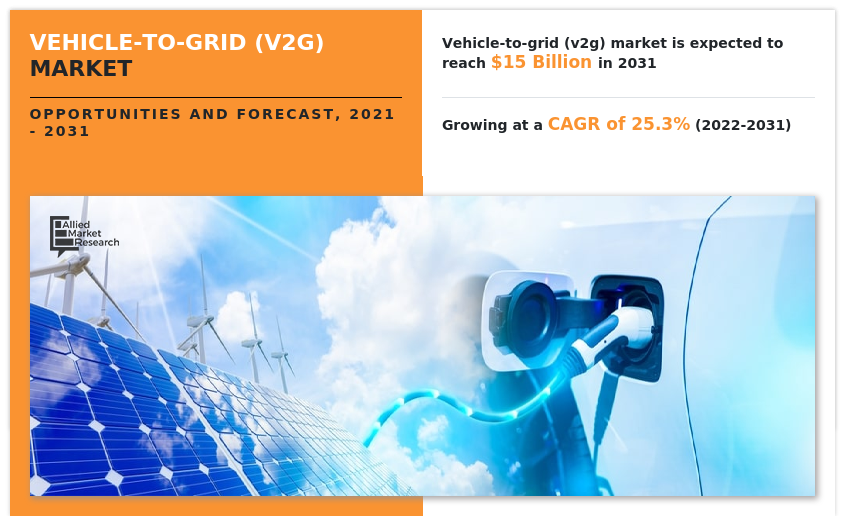
The vehicle-to-grid (v2g) market is segmented into Vehicle Type, Components, Technology and Charging Type.
Vehicle-to-grid (V2G) is a technology that enables energy to be pushed back to the power grid from the battery of an electric car. A car battery can be charged and discharged based on different signals such as energy production or consumption nearby with vehicle-to-grid technology. It provides a mechanism to meet the requirements of the electric power system by using parked electric automobiles. V2G can be used with plug-in electric vehicles, such as battery electric vehicles (BEV), plug-in hybrids (PHEV) or hydrogen fuel cell electric vehicles (FCEV).
Factors such as increase in demand for electric vehicles, and government initiatives for development of electric vehicle charging infrastructure are anticipated to boost the growth of the global vehicle-to-grid (V2G) market during the forecast timeframe. However, lack of sufficient infrastructure, and lack of standardization of electric vehicle (EV) charging are expected to hinder the growth of the global V2G market during the forecast period. Moreover, rapid increase in urbanization & industrialization, and rise in demand for solar powered electric vehicles are expected to create growth opportunities for the market in the near future.
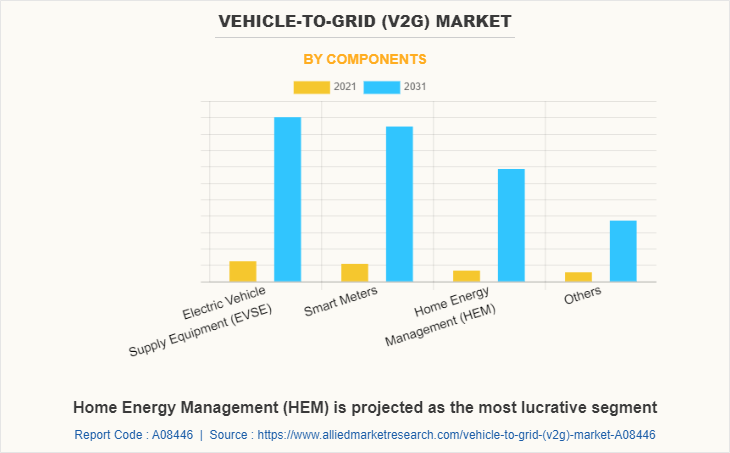
The vehicle-to-grid (V2G) market is segmented on the basis of technology, charging type, vehicle type, component, and region. By technology, it is bifurcated into power management, and software. By charging type, it is fragmented into unidirectional charging, and bidirectional charging. By vehicle type, it is divided into battery electric vehicles, plug-in hybrid electric vehicles, and fuel cell vehicles (FCVs). By component, it is classified into integrated electric vehicle supply equipment (EVSE), smart meters, home energy management (HEM), and others. By region, the market is analyzed across North America, Europe, Asia-Pacific, and LAMEA.
The key players that operate in this vehicle-to-grid (V2G) market include ABB, AC Propulsion, Inc., Boulder Electric Vehicle, Denso Corporation, Edison International, EnerDel, Inc., EV Grid, Inc., Fermata Energy, Hitachi, Ltd, Honda Motor Co., Ltd., Indra, Nissan Motor Corporation, NRG Energy, Inc., Nuvve Holding Corp., OVO Energy Ltd., Toyota Industries Corporation, and Wallbox Inc.
Increase in demand for electric vehicles
Electric vehicles offer multiple advantages such as low operating cost compared to conventional gasoline engine, implementation of stringent government regulations to limit environment pollution, and decreased emissions from tailpipes, which significantly boost their demand across the globe. For instance, electric vehicle sales have increased, owing to growth in China, the U.S., and Europe. Sales of electric vehicles increased by 160% in the first half of 2021 from a year earlier, to 2.6 million units, representing 26% of new sales in the global automotive market.
Therefore, factors such as increase in charging stations in public places & highways, low operating cost, and implementation of stringent government regulations to limit environment pollution are expected to spur electric vehicles across the globe. The key players operating in the vehicle-to-grid (V2G) market are adopting various strategic moves such as product development and product launch to tap the business potential. For instance, in November 2020, Nuvve Corporation, a vehicle-to-grid (V2G) technology company, and Lion Electric, an OEM of all-electric heavy-duty vehicles, collaborated and launched vehicle-to-grid (V2G) technology as a standard feature of Lion’s zero-emission school buses. Therefore, the developments in the electric vehicles market is expected to propel the growth of the V2G market during the forecast period.
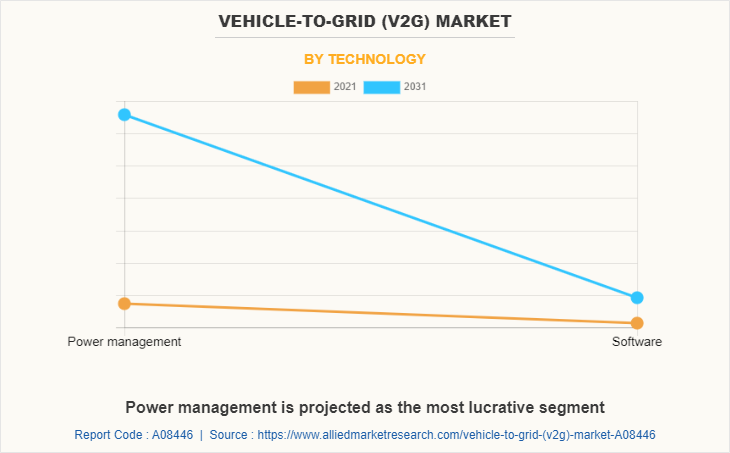
Government initiatives for development of electric vehicle charging infrastructure
Electric vehicle charging infrastructure plays a vital role in mass adoption of electric vehicles, which results in growing support from governments of different countries. Governments of various countries have also recognized the need to go electric to reduce rise in pollution from automobiles and taken several initiatives to provide EV charging stations across the world. For instance, the Automotive Research Association of India (ARAI) planned to deploy more than 200 EV charging stations across the country. In addition, Tata Power (Tata Group (India)), an Indian electric utility company supports the Indian Government's National Electric Mobility Mission, the Tata Power established first set of electric vehicles charging stations in Mumbai (India) for India’s growing EV ecosystem, and provides customers access to energy-efficient options with ease. Moreover, developed countries such as U.S., UK, and China have taken initiatives to improve the charging network across their states for ease for switching to electric vehicles. Also, the government of Japan prepared a policy for electric vehicles in August 2018 for better cooperation and smooth transition in the automotive industry. Along with charging infrastructure, companies are also establishing V2G charging network. With vehicle-to-grid technology, a car battery can be charged and discharged based on different signals such as energy production or consumption nearby. For instance, in September 2020, Nuvve Corporation announced to provide the key technology for a vehicle-to-grid (V2G) project in Japan aimed at establishing the marketization of electricity supply-demand control by 2021. The project is being led by Nuvve investor, Toyota Tsusho Corporation alongside Chubu Electric Power Grid Co., Inc., a Transmission System Operator (TSO) in Japan Vehicle-to-Cloud (V2C). In this project phase, Toyota Tsusho Corporation demonstrated the grid services with Toyota Motor Corporation vehicles such as a Prius PHEV when parked using V2G. Thus, such initiatives are expected to drive growth of the vehicle-to-grid (V2G) market.
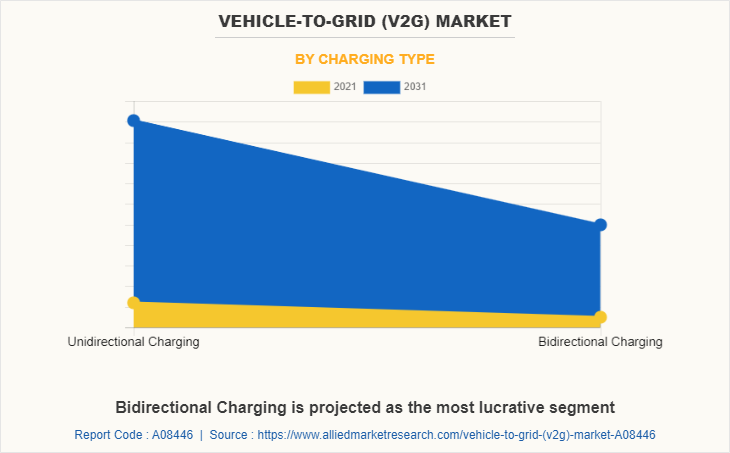
Lack of standardization of electric vehicle (EV) charging
Lack of standardization within EV chargers hinders their demand among end users. Consumers are often hesitant whether such EV chargers are suitable for their vehicles or not. Moreover, the vehicles need flexible charging solutions so they can take advantage of the charging and discharging rates when available. Lack of standardized plugs complicates charging further. Although Tesla, an American electric vehicle and clean energy company based in Palo Alto, California, is expanding its network of chargers, it is designed specifically for Tesla vehicles.
Furthermore, the automotive industry has standardized 120- and 240-volt plugs, which are primarily used in homes but have not yet set a standard on the plugs or ports that can charge vehicles in 30 minutes or less. These charging plugs and sockets are also used for vehicle-to-grid charging. Therefore, lack of standardization hinders the growth of the vehicle-to-grid (V2G) market.
Rapid increase in urbanization & industrialization
The level of industrialization and the level of urbanization have been improved owing to the rapid development of economy and society in several developed countries across the globe. In addition, in recent years, the V2X-based intelligent transport system (ITS) has been developed rapidly because of global urbanization and industrialization, which is considered as the key enabling technology to improve road safety, traffic efficiency, and driving experience.
Moreover, macroeconomics factors such as expansion in disposable income, rise in employment rates and the growing overall GDP are also inspiring the developments such smart cities with smart infrastructures facilities, which in turn is expected to propel the growth of the automotive vehicle to everything (V2X) market which in turn is expected to fuel the growth of the vehicle-to-grid (V2G) market.
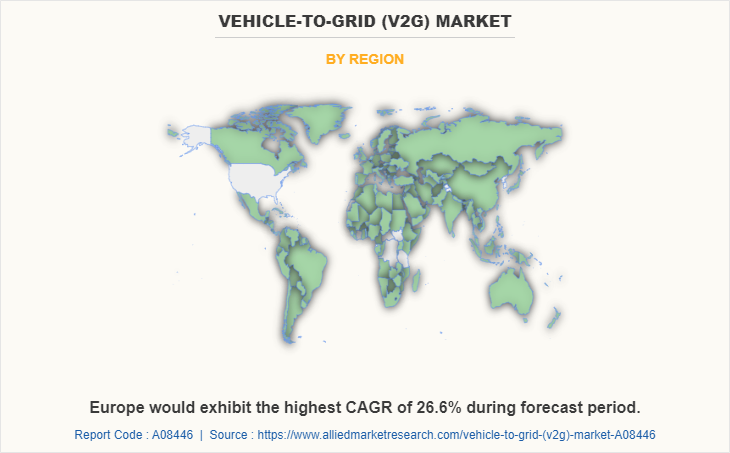
Key Benefits For Stakeholders
- This report provides a quantitative analysis of the market segments, current trends, estimations, and dynamics of the vehicle-to-grid (v2g) market analysis from 2021 to 2031 to identify the prevailing vehicle-to-grid (v2g) market opportunities.
- The market research is offered along with information related to key drivers, restraints, and opportunities.
- Porter's five forces analysis highlights the potency of buyers and suppliers to enable stakeholders make profit-oriented business decisions and strengthen their supplier-buyer network.
- In-depth analysis of the vehicle-to-grid (v2g) market segmentation assists to determine the prevailing market opportunities.
- Major countries in each region are mapped according to their revenue contribution to the global market.
- Market player positioning facilitates benchmarking and provides a clear understanding of the present position of the market players.
- The report includes the analysis of the regional as well as global vehicle-to-grid (v2g) market trends, key players, market segments, application areas, and market growth strategies.
Vehicle-To-Grid (V2G) Market Report Highlights
| Aspects | Details |
| By Vehicle Type |
|
| By Components |
|
| By Technology |
|
| By Charging Type |
|
| By Region |
|
| Key Market Players | Hitachi, Ltd, AC Propulsion, Inc., ABB, Indra, Toyota-shokki, Edison International, DENSO Co., Boulder Electric Vehicle, Wallbox, EV Grid, Inc, EnerDel, Inc, Nuvve Corporation, Fermata Energy, Honda, NRG Energy, Inc, Nissan Motor Corporation, OVO Energy Ltd |
Analyst Review
The vehicle-to-grid (V2G) market is expected to witness significant growth, due to increase in demand for charging stations and infrastructure to help balance supply and demand for electrical power. The presence of stringent fuel efficiency norms across the globe has compelled vehicle manufacturers to develop zero emission technology for the vehicles. This further enhances the growth of the V2G infrastructure. The vehicle-to-grid (V2G) market is expected to allow owners of vehicles to sell electricity from vehicles back to the grid during the peak periods.
Factors such as increase in demand for electric vehicles, and government initiatives for development of electric vehicle charging infrastructure are anticipated to boost the growth of the global vehicle-to-grid (V2G) market during the forecast timeframe. However, lack of sufficient infrastructure, and lack of standardization of electric vehicle (EV) charging are expected to hinder the growth of the global vehicle-to-grid (V2G) market during the forecast period. Moreover, rapid increase in urbanization & industrialization, and rise in demand for solar powered electric vehicles are expected to create an opportunity for the vehicle-to-grid (V2G) market in near future.
To fulfil the changing demand scenarios, market participants are focusing on partnership and agreement strategy to meet new business opportunities. For instance, in April 2022, ABB signed an agreement with Shell to provide its technology to help the latter grow its EV charging network. This includes both AC and DC charging as well as vehicle-to-grid (V2G) technology. Moreover, on May 2022, Nuvve Holding Corp. signed an agreement with Power Electronics to integrate Nuvve’s vehicle-to-grid (V2G) GIVe platform with Power Electronics charging station technology to help intelligently electrify vehicles and help achieve global decarbonization goals.
In addition, market participants are continuously focusing on product launch to offer a diverse range of products. For instance, in October 2020, ABB announced to launch its bi-directional V2G EV charging technology to a Vehicle-To-Grid (V2G) partnership project, as part of a contract with France’s DREEV, a joint venture between Électricité de France (EDF) and Nuvve, which specializes in intelligent charging for EVs.
The key players that operate in this market include ABB, AC Propulsion, Inc., Boulder Electric Vehicle, Denso Corporation, Edison International, EnerDel, Inc., EV Grid, Inc., Fermata Energy, Hitachi, Ltd, Honda Motor Co., Ltd., Indra, Nissan Motor Corporation, NRG Energy, Inc., Nuvve Holding Corp., OVO Energy Ltd., Toyota Industries Corporation, and Wallbox Inc
The global vehicle-to-grid (V2G) market was valued at $1.72 billion in 2021, and is projected to reach $15.03 billion by 2031.
Government initiatives for development of electric vehicle charging infrastructure, and rise in demand for solar powered electric vehicles are upcoming trends of Vehicle-To-Grid (V2G) Market
Electric Vehicle Supply Equipment (EVSE) is the leading application of Vehicle-To-Grid (V2G) Market
Europe is the largest regional market for Vehicle-To-Grid (V2G)
The key players that operate in this market include ABB, AC Propulsion, Inc., Boulder Electric Vehicle, Denso Corporation, Edison International, EnerDel, Inc., EV Grid, Inc., Fermata Energy, Hitachi, Ltd, Honda Motor Co., Ltd., Indra, Nissan Motor Corporation, NRG Energy, Inc., Nuvve Holding Corp., OVO Energy Ltd., Toyota Industries Corporation, and Wallbox Inc.
Loading Table Of Content...



